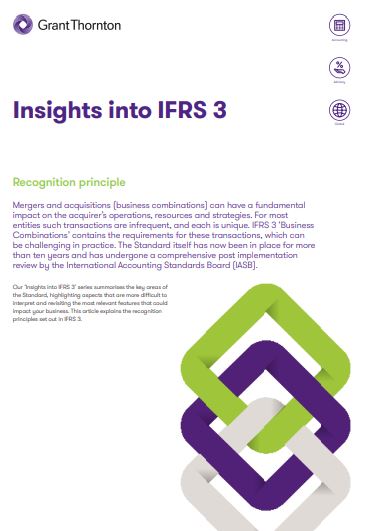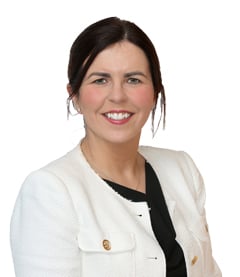
For most entities such transactions are infrequent, and each is unique. IFRS 3 ‘Business Combinations’ contains the requirements for these transactions, which can be challenging in practice. The Standard itself has now been in place for more than ten years and has undergone a comprehensive post implementation review by the International Accounting Standards Board (IASB).
Our ‘Insights into IFRS 3’ series summarises the key areas of the Standard, highlighting aspects that are more difficult to interpret and revisiting the most relevant features that could impact your business. This article explains the recognition principles set out in IFRS 3.
Overview of IFRS 3’s recognition and measurement principles
The acquisition method requires the acquirer, to recognise and measure the acquiree’s identifiable assets acquired and liabilities assumed at their acquisition-date fair values, subject to some exceptions. These assets and liabilities usually include assets and liabilities already reported in the acquiree’s financial statements.
Applying the acquisition method may, however, also result in recognising assets and liabilities that were not previously reported in the acquiree’s financial statements for instance a brand name, a patent or a customer relationship, as the acquiree developed them internally.
IFRS 3’s recognition and measurement principles should be applied to determine which assets and liabilities to recognise and how they should be measured. The identifiable assets acquired and liabilities assumed should consist of those that:
- belong to the acquiree at the date of acquisition, and;
- form part of what has been acquired by the acquirer.
Most, but not quite all, of these assets and liabilities are measured at fair value at the acquisition date – the so called ‘fair value exercise’. (The term ‘purchase price allocation’ is still frequently used to describe this process although it does not perfectly align with the IFRS 3 accounting model). This fair value exercise is usually a complex and timeconsuming step in accounting for a business combination.
Practical insight
-
The objective of this exercise is to identify the main items for which the acquirer made the decision to purchase the business. Establishing the core reasons for making the purchase should help to identify the intangible assets acquired, that is, what did the acquirer get in return for the consideration paid and what they were willing to pay for? For example, was it to gain access to a specific technology, to acquire a trademark with a market share (this is usually associated with a technology, a know-how or a process)?
Many entities engage outside specialists in the valuation area to provide assistance. In most cases this step requires a good knowledge of the business acquired, careful analysis, extensive use of estimates and management judgement in a number of areas.
Refer to our article ‘Insights into IFRS 3 – How should the identifiable assets and liabilities be measured?’ for more details on the fair value exercise.
In an acknowledgement of these challenges, IFRS 3 allows a ‘measurement period’ of up to twelve months from the date of acquisition for the acquirer to complete the initial accounting for the business combination.
Sign up for expert insights, industry trends, and key updates—delivered straight to you.









